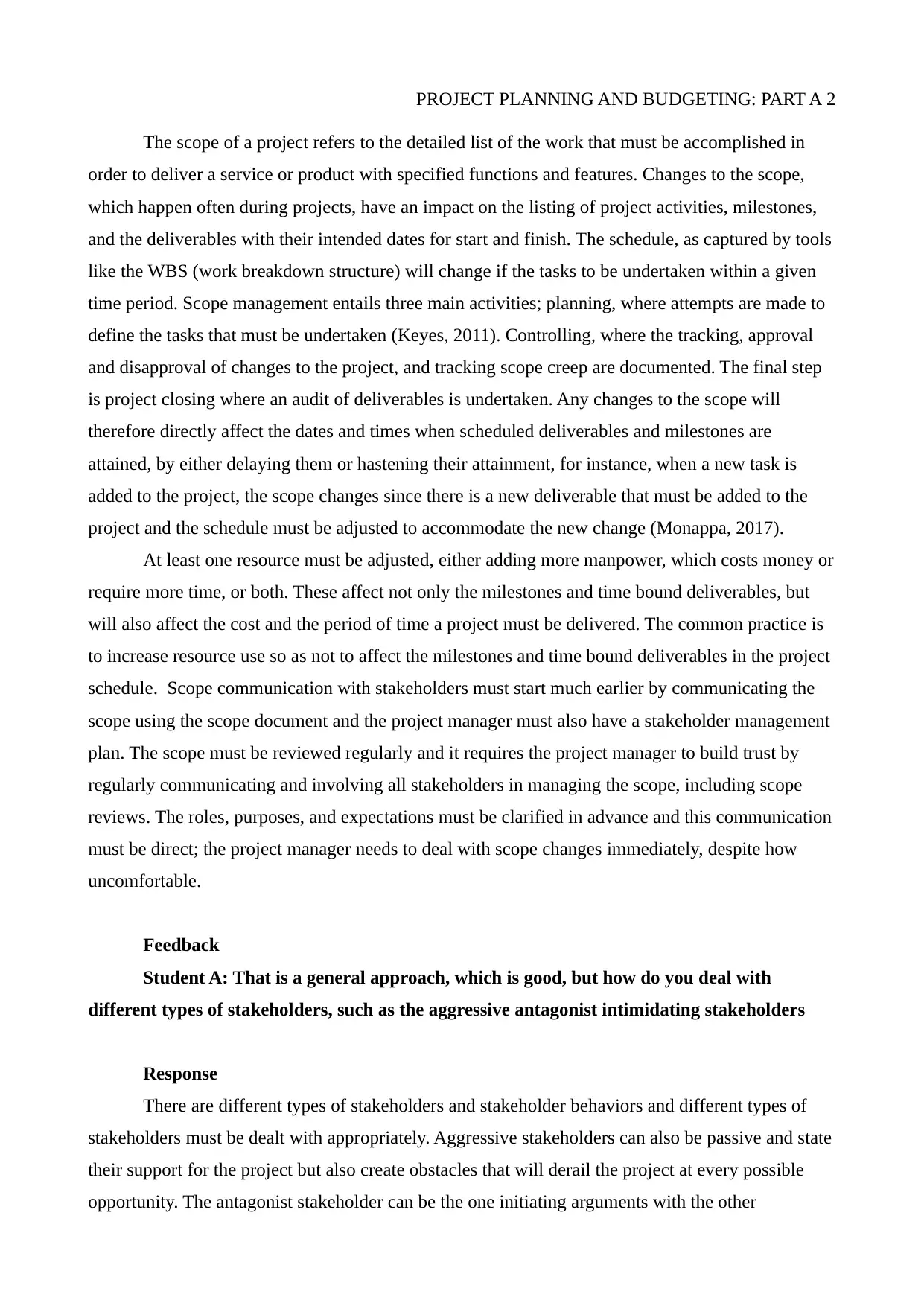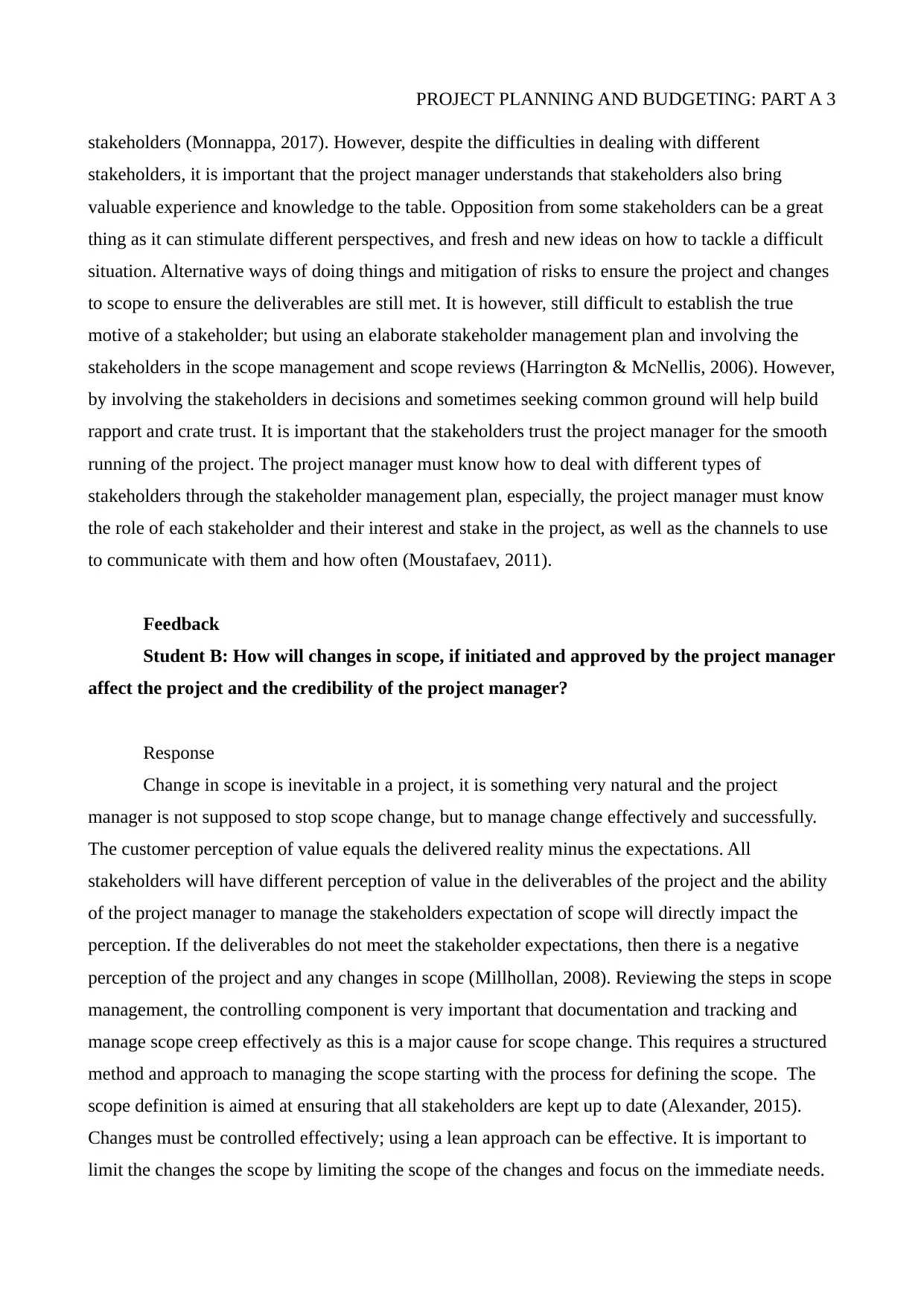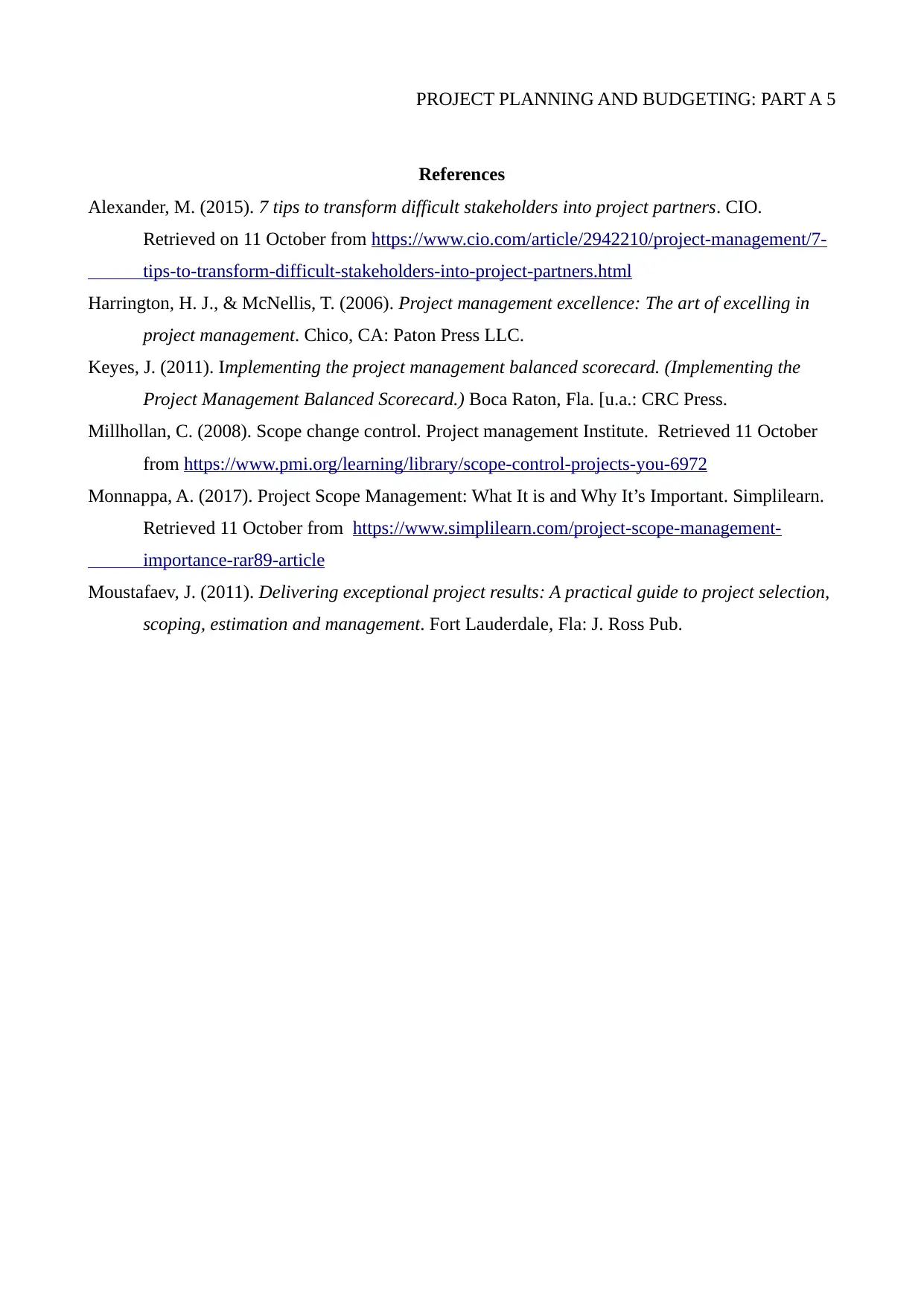Project Planning and Budgeting: Stakeholder and Scope Management
VerifiedAdded on 2020/03/15
|5
|1197
|256
Project
AI Summary
This project planning and budgeting assignment, Part A, delves into the critical aspects of project scope and stakeholder management. It defines project scope, emphasizing the importance of detailed work lists, deliverables, and the impact of scope changes on project schedules, resources, and costs. The assignment addresses stakeholder management, including strategies for handling different stakeholder behaviors, such as aggressive or antagonist stakeholders, and highlights the value of diverse perspectives. It discusses effective communication, building trust, and managing stakeholder expectations. Furthermore, the project examines the effects of scope changes on project credibility and the project manager's role in controlling and communicating these changes. It also references key concepts like scope creep and the importance of stakeholder involvement in decision-making processes. The responses provided by Student A and Student B are analyzed, offering practical insights into these concepts.

PROJECT PLANNING AND BUDGETING: PART A 1
Project Planning and budgeting: Part A
Name
Date
Project Planning and budgeting: Part A
Name
Date
Paraphrase This Document
Need a fresh take? Get an instant paraphrase of this document with our AI Paraphraser

PROJECT PLANNING AND BUDGETING: PART A 2
The scope of a project refers to the detailed list of the work that must be accomplished in
order to deliver a service or product with specified functions and features. Changes to the scope,
which happen often during projects, have an impact on the listing of project activities, milestones,
and the deliverables with their intended dates for start and finish. The schedule, as captured by tools
like the WBS (work breakdown structure) will change if the tasks to be undertaken within a given
time period. Scope management entails three main activities; planning, where attempts are made to
define the tasks that must be undertaken (Keyes, 2011). Controlling, where the tracking, approval
and disapproval of changes to the project, and tracking scope creep are documented. The final step
is project closing where an audit of deliverables is undertaken. Any changes to the scope will
therefore directly affect the dates and times when scheduled deliverables and milestones are
attained, by either delaying them or hastening their attainment, for instance, when a new task is
added to the project, the scope changes since there is a new deliverable that must be added to the
project and the schedule must be adjusted to accommodate the new change (Monappa, 2017).
At least one resource must be adjusted, either adding more manpower, which costs money or
require more time, or both. These affect not only the milestones and time bound deliverables, but
will also affect the cost and the period of time a project must be delivered. The common practice is
to increase resource use so as not to affect the milestones and time bound deliverables in the project
schedule. Scope communication with stakeholders must start much earlier by communicating the
scope using the scope document and the project manager must also have a stakeholder management
plan. The scope must be reviewed regularly and it requires the project manager to build trust by
regularly communicating and involving all stakeholders in managing the scope, including scope
reviews. The roles, purposes, and expectations must be clarified in advance and this communication
must be direct; the project manager needs to deal with scope changes immediately, despite how
uncomfortable.
Feedback
Student A: That is a general approach, which is good, but how do you deal with
different types of stakeholders, such as the aggressive antagonist intimidating stakeholders
Response
There are different types of stakeholders and stakeholder behaviors and different types of
stakeholders must be dealt with appropriately. Aggressive stakeholders can also be passive and state
their support for the project but also create obstacles that will derail the project at every possible
opportunity. The antagonist stakeholder can be the one initiating arguments with the other
The scope of a project refers to the detailed list of the work that must be accomplished in
order to deliver a service or product with specified functions and features. Changes to the scope,
which happen often during projects, have an impact on the listing of project activities, milestones,
and the deliverables with their intended dates for start and finish. The schedule, as captured by tools
like the WBS (work breakdown structure) will change if the tasks to be undertaken within a given
time period. Scope management entails three main activities; planning, where attempts are made to
define the tasks that must be undertaken (Keyes, 2011). Controlling, where the tracking, approval
and disapproval of changes to the project, and tracking scope creep are documented. The final step
is project closing where an audit of deliverables is undertaken. Any changes to the scope will
therefore directly affect the dates and times when scheduled deliverables and milestones are
attained, by either delaying them or hastening their attainment, for instance, when a new task is
added to the project, the scope changes since there is a new deliverable that must be added to the
project and the schedule must be adjusted to accommodate the new change (Monappa, 2017).
At least one resource must be adjusted, either adding more manpower, which costs money or
require more time, or both. These affect not only the milestones and time bound deliverables, but
will also affect the cost and the period of time a project must be delivered. The common practice is
to increase resource use so as not to affect the milestones and time bound deliverables in the project
schedule. Scope communication with stakeholders must start much earlier by communicating the
scope using the scope document and the project manager must also have a stakeholder management
plan. The scope must be reviewed regularly and it requires the project manager to build trust by
regularly communicating and involving all stakeholders in managing the scope, including scope
reviews. The roles, purposes, and expectations must be clarified in advance and this communication
must be direct; the project manager needs to deal with scope changes immediately, despite how
uncomfortable.
Feedback
Student A: That is a general approach, which is good, but how do you deal with
different types of stakeholders, such as the aggressive antagonist intimidating stakeholders
Response
There are different types of stakeholders and stakeholder behaviors and different types of
stakeholders must be dealt with appropriately. Aggressive stakeholders can also be passive and state
their support for the project but also create obstacles that will derail the project at every possible
opportunity. The antagonist stakeholder can be the one initiating arguments with the other

PROJECT PLANNING AND BUDGETING: PART A 3
stakeholders (Monnappa, 2017). However, despite the difficulties in dealing with different
stakeholders, it is important that the project manager understands that stakeholders also bring
valuable experience and knowledge to the table. Opposition from some stakeholders can be a great
thing as it can stimulate different perspectives, and fresh and new ideas on how to tackle a difficult
situation. Alternative ways of doing things and mitigation of risks to ensure the project and changes
to scope to ensure the deliverables are still met. It is however, still difficult to establish the true
motive of a stakeholder; but using an elaborate stakeholder management plan and involving the
stakeholders in the scope management and scope reviews (Harrington & McNellis, 2006). However,
by involving the stakeholders in decisions and sometimes seeking common ground will help build
rapport and crate trust. It is important that the stakeholders trust the project manager for the smooth
running of the project. The project manager must know how to deal with different types of
stakeholders through the stakeholder management plan, especially, the project manager must know
the role of each stakeholder and their interest and stake in the project, as well as the channels to use
to communicate with them and how often (Moustafaev, 2011).
Feedback
Student B: How will changes in scope, if initiated and approved by the project manager
affect the project and the credibility of the project manager?
Response
Change in scope is inevitable in a project, it is something very natural and the project
manager is not supposed to stop scope change, but to manage change effectively and successfully.
The customer perception of value equals the delivered reality minus the expectations. All
stakeholders will have different perception of value in the deliverables of the project and the ability
of the project manager to manage the stakeholders expectation of scope will directly impact the
perception. If the deliverables do not meet the stakeholder expectations, then there is a negative
perception of the project and any changes in scope (Millhollan, 2008). Reviewing the steps in scope
management, the controlling component is very important that documentation and tracking and
manage scope creep effectively as this is a major cause for scope change. This requires a structured
method and approach to managing the scope starting with the process for defining the scope. The
scope definition is aimed at ensuring that all stakeholders are kept up to date (Alexander, 2015).
Changes must be controlled effectively; using a lean approach can be effective. It is important to
limit the changes the scope by limiting the scope of the changes and focus on the immediate needs.
stakeholders (Monnappa, 2017). However, despite the difficulties in dealing with different
stakeholders, it is important that the project manager understands that stakeholders also bring
valuable experience and knowledge to the table. Opposition from some stakeholders can be a great
thing as it can stimulate different perspectives, and fresh and new ideas on how to tackle a difficult
situation. Alternative ways of doing things and mitigation of risks to ensure the project and changes
to scope to ensure the deliverables are still met. It is however, still difficult to establish the true
motive of a stakeholder; but using an elaborate stakeholder management plan and involving the
stakeholders in the scope management and scope reviews (Harrington & McNellis, 2006). However,
by involving the stakeholders in decisions and sometimes seeking common ground will help build
rapport and crate trust. It is important that the stakeholders trust the project manager for the smooth
running of the project. The project manager must know how to deal with different types of
stakeholders through the stakeholder management plan, especially, the project manager must know
the role of each stakeholder and their interest and stake in the project, as well as the channels to use
to communicate with them and how often (Moustafaev, 2011).
Feedback
Student B: How will changes in scope, if initiated and approved by the project manager
affect the project and the credibility of the project manager?
Response
Change in scope is inevitable in a project, it is something very natural and the project
manager is not supposed to stop scope change, but to manage change effectively and successfully.
The customer perception of value equals the delivered reality minus the expectations. All
stakeholders will have different perception of value in the deliverables of the project and the ability
of the project manager to manage the stakeholders expectation of scope will directly impact the
perception. If the deliverables do not meet the stakeholder expectations, then there is a negative
perception of the project and any changes in scope (Millhollan, 2008). Reviewing the steps in scope
management, the controlling component is very important that documentation and tracking and
manage scope creep effectively as this is a major cause for scope change. This requires a structured
method and approach to managing the scope starting with the process for defining the scope. The
scope definition is aimed at ensuring that all stakeholders are kept up to date (Alexander, 2015).
Changes must be controlled effectively; using a lean approach can be effective. It is important to
limit the changes the scope by limiting the scope of the changes and focus on the immediate needs.
⊘ This is a preview!⊘
Do you want full access?
Subscribe today to unlock all pages.

Trusted by 1+ million students worldwide

PROJECT PLANNING AND BUDGETING: PART A 4
The preliminary scope must be defined and develop a plan of the final acceptance is and how it
impacts the sponsors.
The preliminary scope must be defined and develop a plan of the final acceptance is and how it
impacts the sponsors.
Paraphrase This Document
Need a fresh take? Get an instant paraphrase of this document with our AI Paraphraser

PROJECT PLANNING AND BUDGETING: PART A 5
References
Alexander, M. (2015). 7 tips to transform difficult stakeholders into project partners. CIO.
Retrieved on 11 October from https://www.cio.com/article/2942210/project-management/7-
tips-to-transform-difficult-stakeholders-into-project-partners.html
Harrington, H. J., & McNellis, T. (2006). Project management excellence: The art of excelling in
project management. Chico, CA: Paton Press LLC.
Keyes, J. (2011). Implementing the project management balanced scorecard. (Implementing the
Project Management Balanced Scorecard.) Boca Raton, Fla. [u.a.: CRC Press.
Millhollan, C. (2008). Scope change control. Project management Institute. Retrieved 11 October
from https://www.pmi.org/learning/library/scope-control-projects-you-6972
Monnappa, A. (2017). Project Scope Management: What It is and Why It’s Important. Simplilearn.
Retrieved 11 October from https://www.simplilearn.com/project-scope-management-
importance-rar89-article
Moustafaev, J. (2011). Delivering exceptional project results: A practical guide to project selection,
scoping, estimation and management. Fort Lauderdale, Fla: J. Ross Pub.
References
Alexander, M. (2015). 7 tips to transform difficult stakeholders into project partners. CIO.
Retrieved on 11 October from https://www.cio.com/article/2942210/project-management/7-
tips-to-transform-difficult-stakeholders-into-project-partners.html
Harrington, H. J., & McNellis, T. (2006). Project management excellence: The art of excelling in
project management. Chico, CA: Paton Press LLC.
Keyes, J. (2011). Implementing the project management balanced scorecard. (Implementing the
Project Management Balanced Scorecard.) Boca Raton, Fla. [u.a.: CRC Press.
Millhollan, C. (2008). Scope change control. Project management Institute. Retrieved 11 October
from https://www.pmi.org/learning/library/scope-control-projects-you-6972
Monnappa, A. (2017). Project Scope Management: What It is and Why It’s Important. Simplilearn.
Retrieved 11 October from https://www.simplilearn.com/project-scope-management-
importance-rar89-article
Moustafaev, J. (2011). Delivering exceptional project results: A practical guide to project selection,
scoping, estimation and management. Fort Lauderdale, Fla: J. Ross Pub.
1 out of 5
Related Documents
Your All-in-One AI-Powered Toolkit for Academic Success.
+13062052269
info@desklib.com
Available 24*7 on WhatsApp / Email
![[object Object]](/_next/static/media/star-bottom.7253800d.svg)
Unlock your academic potential
Copyright © 2020–2026 A2Z Services. All Rights Reserved. Developed and managed by ZUCOL.





